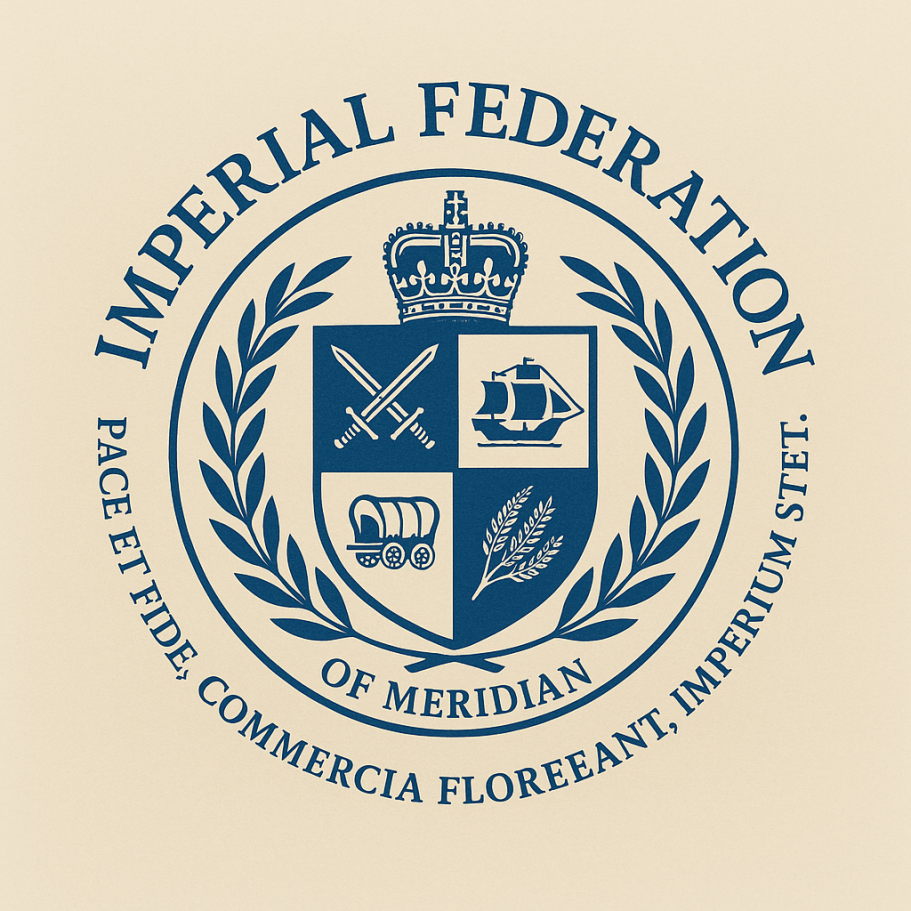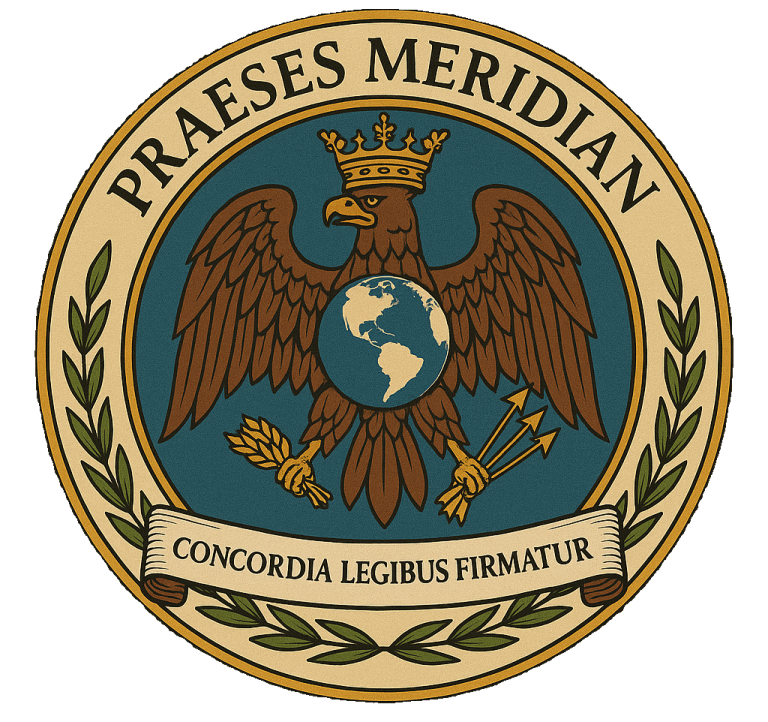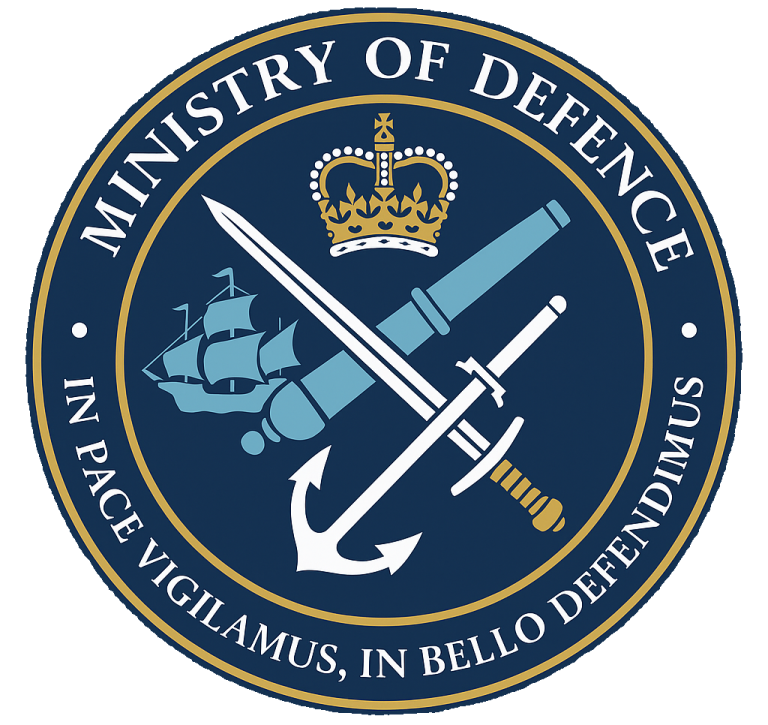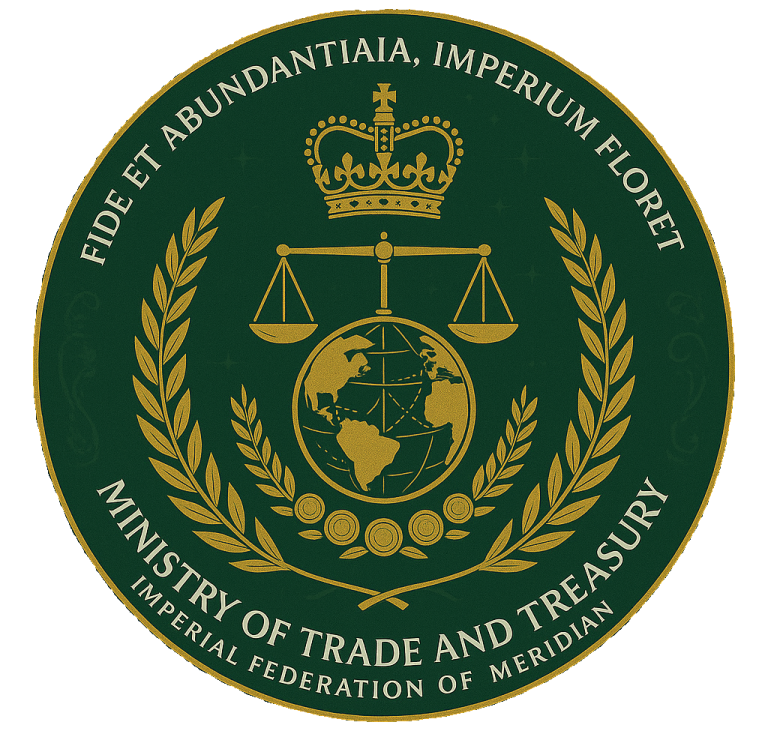
Emperor is the sovereign symbol of the Empire’s unity, cultural legacy, and spiritual legitimacy, and shall serve as guardian of its founding principles.
The powers and prerogatives of the Emperor include:
- Acting as Supreme Protector of the Constitution and guardian of its integrity
- Serving as Commander-in-Chief in times of war and emergency defence
- Dissolving the Grand Assembly or Presidential Government when required for constitutional preservation
- Granting or withholding Imperial Assent to legislation
- Appointing Imperial Inspectors, Justiciars, and emergency administrative officials
- Declaring states of emergency and issuing Imperial Edicts binding by law
- Intervening with force to protect unity, subjects, or Imperial law
- Holding a formal vote in the Presidential Council, equal to that of a Minister
- Conferring noble titles, awards, and charters of land or governance
The Emperor shall reign for life, or until lawful abdication, and shall be revered as the living embodiment of the Constitution.
The Emperor shall not be subject to ordinary trial and may only be questioned by unanimous vote of the Grand Assembly and High Imperial Court.
The Emperor's Imperial Crest is the divine sign and seal of His Imperial Majesty.
Regno Sub Lege Et Honore - Kingdom under Law and Honour
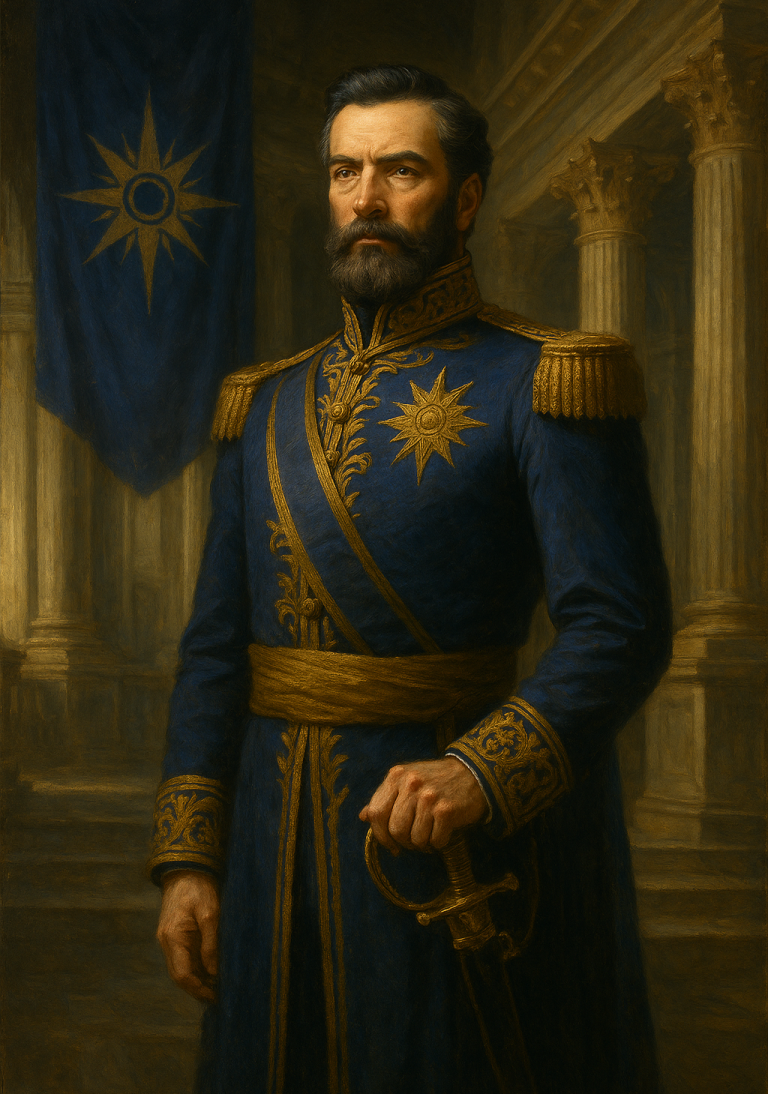
Born in the 113th year of the Concordant Era, Caedros Aurelion was raised within the serene cloisters of the Royal Sanctuary of Elessen, under the guidance of his mother, Valessaria of House Caelvane, and the silent watch of tutors, tribunal scribes, and philosophers. His father, Aurelthane VIII, reigned in physical frailty and political silence, prompting the young Caedros to grow up not in the court, but within the gardens and libraries of Meridian’s spiritual heart.
Educated in law, doctrine, ethics, and imperial philosophy, Caedros displayed an early gift for restraint and reason. He developed a deep understanding of the Concordant Constitution, often memorizing obscure tribunal rulings and federal protocols. He was particularly drawn to the myth of the Concordant Memory—a condition said to bless chosen emperors with perfect recall and insight. Whether he possesses the trait or not, his quiet brilliance and solemn dignity have earned him near-mythic status among the Imperial Court.
As unrest deepened during the final years of Aurelthane VIII’s reign, Caedros remained out of the public eye, serving as an anonymous advisor to both tribunal scribes and civil ministers. Upon his father’s death in C.E. 148, he declined a public coronation. Instead, he was anointed in silence, alone with the Codex and Crown beneath the Dome of Meridian. This act of humility resonated throughout the Federation, calming provincial tensions and reaffirming the dignity of the Eternal Crown.
In the fifteen years since his coronation, Caedros Aurelion has become the still point around which the great mechanism of the Federation turns. He does not govern directly, but his presence is felt in every tribunal oath, every federal charter, every watchman's salute. Under his reign, the Meridian Provost Guard was restored, the Council of Archons granted voice, and the ministries realigned to balance internal security with provincial rights. His few public addresses are delivered in perfect cadence, always beneath the Star of Meridian, and always on days of solemn remembrance or restoration.
Emperor Caedros Aurelion has never married, nor named an heir. He is said to walk the Hall of the Lamp at midnight and to pray beneath the dome without guards. Though the ministries and assemblies direct the Federation's laws, it is Caedros who remains its enduring spirit—the Defender of the Eternal Crown.
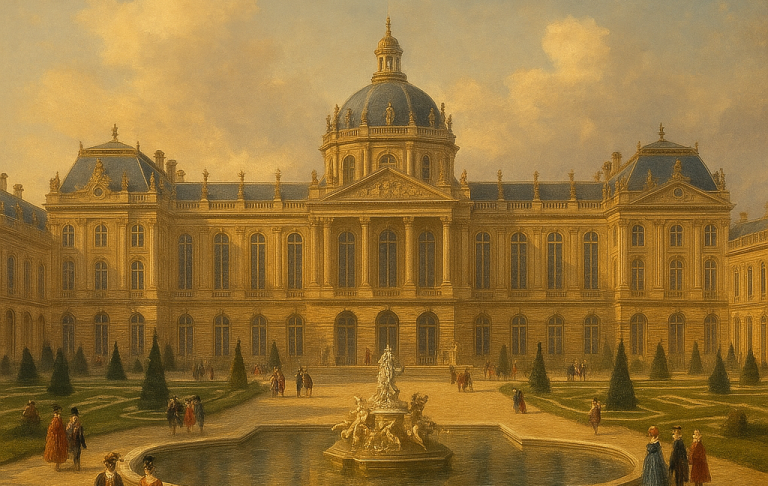

Rising at the northern crest of Concordis, the Palace of Meridian Light stands as the ceremonial heart of the Imperial Federation. Its vast façade is a masterwork of neoclassical symmetry, crowned by a great central dome inlaid with sapphire-hued slate and veined with gold. Colonnades extend to either wing, enclosing inner gardens adorned with statues of past emperors, laureled poets, and Concordant founders. At its centre, a grand reflecting pool mirrors the palace’s dome—symbolizing the Emperor’s role as a reflection, not ruler, of the Federation’s unity.
Though it bears the name of palace, the Palace of Meridian Light is no place of imperial command, but a sanctified residence of presence and memory. Here lives the Emperor, not as monarch, but as custodian of the Eternal Crown. The palace hosts oath-swearings, day-of-concord ceremonies, and sacred vigils. It contains the Hall of the Lamp, where the Emperor receives philosophers and tribunal elders; the Meridian Gallery, where portraits of all emperors are displayed; and the Chamber of Seals, wherein the Concordant Codex is preserved under crystal and bronze.
The Palace of Meridian Light does not issue decrees nor draft law, yet its presence casts long light. Foreign dignitaries pass through its white-marble porticoes to present offerings of peace. Citizens gather before its gates to witness the Lantern Vigils each solstice. Its stillness is revered by all factions, and though it lies within the city, it is governed by none save the Emperor. To the people of the Federation, the palace is a living monument—at once ancestral, divine, and humbly enduring.
Lorem ipsum dolor sit amet, consectetur adipiscing elit. Nulla euismod condimentum felis vitae efficitur. Sed vel dictum quam, at blandit leo.
Emperor
Emperor Caedros Aurelion

Emperor is the sovereign symbol of the Empire’s unity, cultural legacy, and spiritual legitimacy, and shall serve as guardian of its founding principles.
The powers and prerogatives of the Emperor include:
- Acting as Supreme Protector of the Constitution and guardian of its integrity
- Serving as Commander-in-Chief in times of war and emergency defence
- Dissolving the Grand Assembly or Presidential Government when required for constitutional preservation
- Granting or withholding Imperial Assent to legislation
- Appointing Imperial Inspectors, Justiciars, and emergency administrative officials
- Declaring states of emergency and issuing Imperial Edicts binding by law
- Intervening with force to protect unity, subjects, or Imperial law
- Holding a formal vote in the Presidential Council, equal to that of a Minister
- Conferring noble titles, awards, and charters of land or governance
The Emperor shall not be subject to ordinary trial and may only be questioned by unanimous vote of the Grand Assembly and High Imperial Court.
The Emperor's Imperial Crest is the divine sign and seal of His Imperial Majesty.
Regno Sub Lege Et Honore - Kingdom under Law and Honour
The Emperor shall reign for life, or until lawful abdication, and shall be revered as the living embodiment of the Constitution.

Emperor


Lorem ipsum dolor sit amet, consectetur adipiscing elit. Nulla euismod condimentum felis vitae efficitur. Sed vel dictum quam, at blandit leo.
Lorem ipsum dolor sit amet, consectetur adipiscing elit. Nulla euismod condimentum felis vitae efficitur. Sed vel dictum quam, at blandit leo.
Hall of Concord
"To serve as the eternal seat of governance, unity, and deliberation for the Empire; where the voice of the People, the will of the Crown, and the guidance of Law converge in solemn harmony."
Seat of Governance
- Houses the Grand Assembly, the Empire’s supreme legislative body.
- Contains the Imperial Offices of the Emperor and the President.
- Serves as the administrative and ceremonial hub of the Federation.
Chamber of Law and Voice
- The location where laws are proposed, debated, amended, and enacted.
- Where treaties, declarations of war, and national policies are ratified.
- Site for Grand Assembly votes of confidence, impeachment proceedings, and constitutional amendments.
Symbol of Unity
- Embodies the indivisible bond between provinces, dominions, and territories under the Crown.
- A neutral, sacred space — no military force, provincial banners, or factional claims may be asserted within its grounds.
- The architecture and design reflect the diverse heritages of all Imperial regions, unified in a single grand vision.
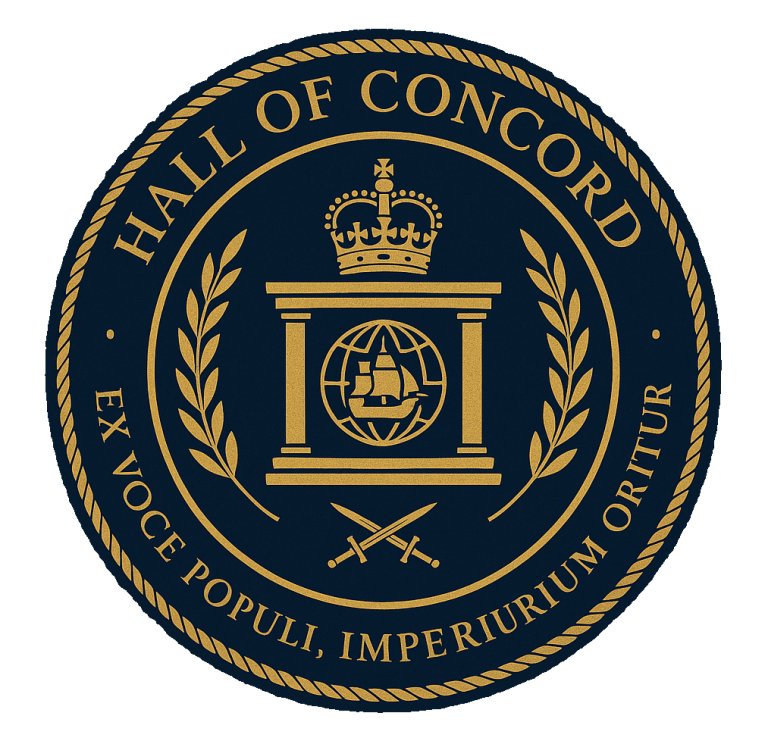
"Ex Voce Populi, Imperium Oritur."
("From the Voice of the People, the Empire Rises.")
Concordis itself — the city where the Hall stands — means "harmony" or "hearts together."
The Hall of Concord is often called “the Heart of the Empire” or “the Second Crown” — the first being the Emperor himself.
Its highest chamber, the Rotunda of Unity, has a star-map ceiling marking the founding of the Empire.
Custodian of Tradition and Progress
- Preserves the founding documents of the Federation, including the Constitution, the Codex of Imperial Law, and Imperial Edicts.
- Hosts state ceremonies, such as the Imperial Accession, Presidential Oaths, and sessions of remembrance for national heroes.
- Acts as a living testament to the Empire’s motto: "Regno in Pace et Unitate, Sub Lege et Honore, Imperium Æternum."
("I rule in peace and unity, under law and honor, an eternal empire.")
Safeguard of Public Trust
- All sessions of the Grand Assembly are recorded and archived within the Hall’s Grand Archives.
- Citizens may observe Assembly debates from the public galleries, reinforcing transparency and civic participation.

Hall of Concord

Grand Assembly Chamber

Presidential Office
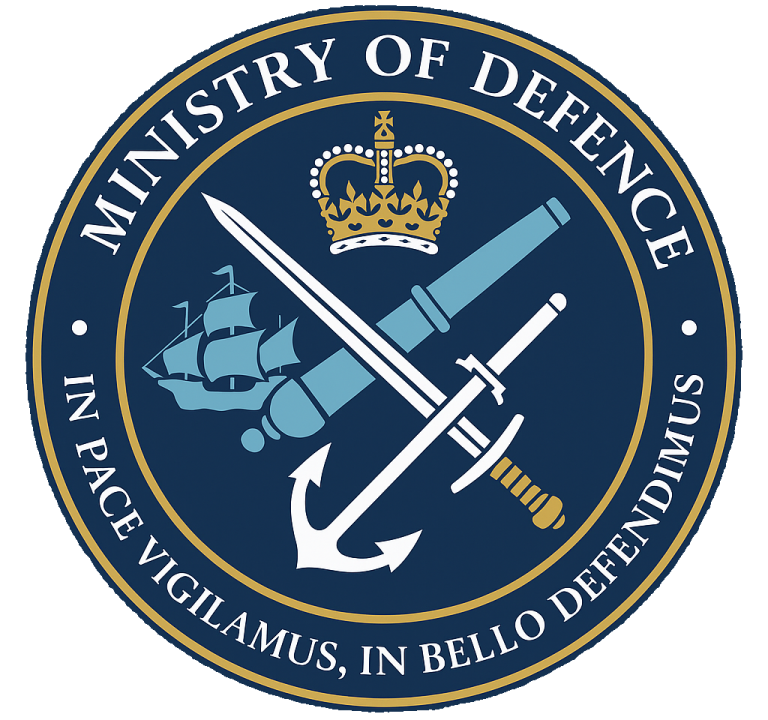
The official motto of the Ministry of Justice shall be:
"In Pace Vigilamus, In Bello Defendimus."
The Seal of the Ministry shall bear the Crossed Sword, Anchor, and Cannon beneath an Imperial Crown, set before a Stylized Warship and a Deep Navy Field, all encircled by a Ring of Gold bearing the name of the Ministry at the summit and its motto at the base, inscribed in luminous script. The design symbolizes eternal vigilance in peace and unyielding defence in war, under the sacred authority of the Crown.
The Ministry of Defence is constituted as an executive organ of the Imperial Federation of Meridian, subordinate only to the Constitution, the Codex of Imperial Law, and the authority of the Crown.
Its primary mandate is the preservation, protection, and defence of the Federation’s unity, sovereignty, and territorial integrity; the command and maintenance of all Imperial Armed Forces; and the dignified execution of national defence policy, as authorized by the Grand Assembly, proclaimed by the Emperor, or enacted under the Codex of Imperial Law.
Supreme Oversight of the Imperial Armed Forces
Directs and coordinates the following branches:
- Crown’s Ground Command (land forces)
- Imperial Oceanic Command (naval forces)
- Imperial Strategic Corps (static defence forces and strategic infrastructure)
Maintains readiness, discipline, and strategic capability across all formations.
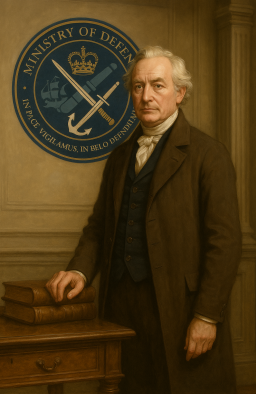
High Minister of the Crown’s Defence, Cyran Albrecht Thorne
“Discipline is the bastion of peace; vigilance, its sword.”

The Hall of the Shield
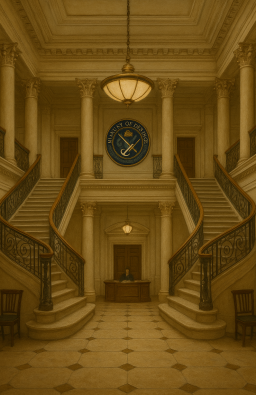
Beyond its iron-gilded gates, the Hall of the Shield greets all who serve with a colonnade of justice and resolve—where the marble floor echoes with the steps of command, and the golden crest above the doors reminds even the boldest general that defence begins not with the sword, but with discipline.
Ministry of Defence
To safeguard the Eternal Empire by land and sea, to defend the unity of Crown and People against all threats, and to stand as vigilant guardians of peace, honour, and sovereignty. In times of peace, we stand watch; in times of war, we stand unyielding. By the strength of our arms, the wisdom of our command, and the fidelity of our service, we preserve the Imperial Federation of Meridian for all generations.
"In Pace Vigilamus, In Bello Defendimus."
("In Peace, We Stand Watch; In War, We Defend.")
Core Responsibilities
- National Security - Develops and implements the national defence strategy during peacetime and wartime. Protects the borders, provinces, dominions, fortifications, docks, and trade routes of the Federation. Oversees command bastions, coastal defences, and military infrastructures critical to the Empire’s survival.
- Command in Peace and War - Commands deployment of forces under orders of the President, the Grand Assembly, or the Emperor in times of national emergency. Manages responses to rebellion, secession, foreign incursion, or existential threats. Advises the Emperor and President on wartime readiness and emergency powers.
- Maritime and Naval Defence - Oversees the Imperial Oceanic Command and its fleets. Secures vital sea lanes, trade routes, coastal cities, and colonial outposts. Suppresses piracy, enforces imperial maritime law, and defends the Federation’s oceanic territories.
- Defence Diplomacy and Alliances - Coordinates military alliances, defensive pacts, and joint exercises with loyal dominions and protectorates. Provides military advice to the Ministry of Diplomacy during treaty negotiations. Oversees peacekeeping and intervention missions authorized by the Grand Assembly.
- Military Justice and Discipline - Upholds the Code of Military Discipline across all branches and commands. Investigates and prosecutes offences such as desertion, insubordination, war crimes, and treason.
- Imperial Armament, Logistics, and Fortification - Manages military production, provisioning, and strategic construction. Administers the arsenal stockpiles, shipyards, fortress networks, and field supply chains.
Organizational Structure
- Minister of Defence – Supreme overseer of Imperial military affairs.
- Crown’s General Staff – High command leaders of land and sea forces.
- Department of Strategic Operations – War planning, grand strategy, and threat response.
- Department of Logistics and Fortifications – Oversight of military supply, engineering, fortresses, bastions, and docks.

The official motto of the Ministry of Justice shall be:
"Ad Integritatem Et Seccuritatem"
The Seal of the Ministry shall bear two Crossed Swords of Silver above a Golden Fortress, all set upon a Crimson Field. The shield shall be surmounted by the Imperial Crown and encircled by a Laurel Wreath of Blue, with the name of the Ministry and the Federation inscribed in solemn script. Beneath, the motto Ad Integritatem et Securitatem shall affirm the Ministry’s sacred charge to preserve the integrity and security of the Imperial Federation of Meridian.
"The Ministry of Internal Affairs is constituted as an executive organ of the Imperial Federation of Meridian, subordinate only to the Constitution, the Codex of Imperial Law, and the authority of the Crown.
Its primary mandate is the preservation of domestic order, the enforcement of internal security, and the unyielding protection of the rights, safety, and stability of all citizens and territories under the Federation. This includes oversight of law enforcement institutions, border integrity, civil defence coordination, and the enforcement of internal statutes as enacted by the Grand Assembly, authorized by the Emperor, or codified in the Codex of Imperial Law."
The Ministry shall exercise its powers independently, yet remain accountable to:
- The Grand Assembly (through oversight of internal security legislation, funding, and civil affairs policy reviews)
- The Emperor (through assent to declarations of internal emergency, national security edicts, or extraordinary enforcement mandates)
- The High Imperial Court (through judicial review of enforcement actions, constitutional disputes, and appeals related to civil liberties or Ministry conduct)
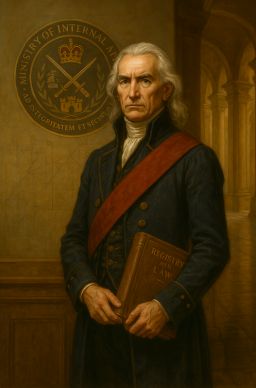
Minister of Internal Affairs, Severan Lucan Virelios
“Law is the silent architecture of peace. It speaks best through order.”

The Hall of Integrity

Within the Hall of Integrity, law does not whisper—it resounds in marble and silence alike. Beneath banners of blue and the gaze of the Eternal Crown, every step taken is measured, every word recorded. Here stands the will of the Federation not in blade or decree, but in discipline, vigilance, and incorruptible order.
Ministry of Internal Affairs
"In solemn recognition that integrity and vigilance are the guardians of order, safety, and civic harmony within the bounds of the Eternal Crown, the Imperial Federation of Meridian hereby ordains and establishes the Ministry of Internal Affairs. Let it stand as the fortress of the lawful, the watchtower of the loyal, and the unseen hand that steadies the heart of the Empire.
Ad Integritatem et Securitatem — For Integrity and Security."
Core Responsibilities
- Enforcement of Internal Security - Coordinates all operations to prevent, detect, and respond to threats against domestic stability. Oversees strategic planning for civil defence during crises, insurrections, or foreign infiltration.
- Supervision of Law Enforcement Bodies - Directly oversees the Concordian Watch, including the Bastion Watch, Crimson Watch, and elite arms such as the Meridian Provost Guard. Regulates provincial and city-level internal security organizations.
- Preservation of Civil Order - Enforces curfews, riot protocols, and emergency civic measures. Manages the lawful conduct of demonstrations, assemblies, and public events.
- Border Integrity and Control - Administers inspections, checkpoint regulation, and movement tracking at national borders and key internal transit points (in peacetime and wartime). Coordinates with military posts during periods of heightened alert.
- Administration of Residency and Identification - Maintains the Imperial Registry of Citizenship and Residency. Issues identity documentation and monitors internal population movement for security purposes.
- Crisis Response and Coordination - Leads civilian emergency response protocols during disasters, sieges, internal attacks, or epidemics. Coordinates with the Ministry of Defence and the Grand Assembly in declarations of internal emergency.
- Inspection and Oversight of Civil Institutions - Conducts legal audits and inspections of lower administrative offices to ensure compliance with Federation law. Investigates corruption, administrative abuse, and dereliction of civic duty.
- Execution of Federation Law - Enforces laws passed by the Grand Assembly and edicts proclaimed by the Emperor. Serves as the civilian authority responsible for carrying out judicial or administrative warrants not within military jurisdiction.
Structure
The Ministry of Internal Affairs shall consist of the following Offices:
- Office of the High Prefect:
Chief administrator and principal voice of the Ministry; directs national policy on internal security and enforcement. - Office of Civil Order:
Oversees domestic law enforcement bodies, including the Concordian Watch and provincial security forces. - Office of Territorial Integrity:
Manages border security, transit checkpoints, and coordinates with military posts to ensure internal territorial control. - Office of Population and Registry:
Maintains the Imperial Registry of Citizenship and Residency; oversees issuance of internal identification and permits. - Office of Emergency Coordination:
Responsible for planning and responding to civil crises, disasters, and large-scale internal threats in coordination with the Ministry of Defence. - Office of Internal Oversight and Conduct:
Investigates corruption, abuse of power, and failures in enforcement across all civil institutions under the Ministry's jurisdiction.
Additional bureaus may be commissioned by decree of the High Prefect, subject to review and assent by the Grand Assembly.

The official motto of the Ministry of Justice shall be:
"In Iustitia, Lux Imperii."
The Seal of the Ministry shall bear the Crowned Scales of Justice, a Radiant Starburst, and a Globe, encircled by a Laurel Wreath, with the name of the Ministry and the Federation inscribed in golden script.
The Ministry shall exercise its powers independently, yet remain accountable to:
- The Grand Assembly (through annual reporting and review)
- The Emperor (through direct assent to major reforms or cases of extraordinary justice)
- The High Imperial Court (through judicial review)

Minister - brief quote

Ministry Building

Lorem ipsum dolor sit amet, consectetur adipiscing elit. Nulla euismod condimentum felis vitae efficitur. Sed vel dictum quam, at blandit leo.
Ministry of Trade and Treasury
In solemn recognition that justice is the cornerstone of enduring peace, noble order, and the preservation of the rights of all citizens under the Eternal Crown, the Imperial Federation of Meridian hereby ordains and establishes the Ministry of Justice. Let it stand as the shield of the innocent, the sword of law, and the lamp by which the Empire's honor and unity are safeguarded.
"In Iustitia, Lux Imperii."
The Ministry of Justice is constituted as an executive organ of the Imperial Federation of Meridian, subordinate only to the Constitution, the Codex of Imperial Law, and the authority of the Crown.
Its primary mandate is the enforcement, preservation, and dignified execution of all laws ratified by the Grand Assembly, proclaimed by the Emperor, or issued under the Codex of Imperial Law.
Duties and Powers
- Guardianship of Law - Enforce the Codex of Imperial Law across all provinces and dominions. Ensure the uniform application of law and judicial standards.
- Oversight of Judiciary - Supervise the High Imperial Court and all subordinate courts. Administer appointments, oaths, and disciplinary proceedings for Magistrates and Judges.
- Legislative Counsel - Advise the Grand Assembly and Presidential Council on all matters pertaining to the creation, amendment, and codification of law.
- Civil Rights Protection - Safeguard the constitutional rights of all citizens. Investigate, prosecute, and remedy violations against persons or property.
- Imperial Prosecution - Conduct prosecutions of high crimes, treason, sedition, corruption, and abuse of office.
- Legal Integrity - Maintain the purity and dignity of the law through the Imperial Codex Revision Office.
- Pardon and Clemency Recommendations - Review petitions for imperial pardon, commutation, or amnesty and issue formal recommendations to His Imperial Majesty.
Structure
The Ministry of Justice shall consist of the following Offices:
- Office of the High Justiciar: Chief administrator and voice of the Ministry.
- Office of Imperial Prosecutions: Oversees the prosecution of high crimes.
- Codex Revision Office: Responsible for maintaining and revising the Codex of Imperial Law.
- Office of Rights and Liberties: Dedicated to monitoring and upholding civil rights.
- Office of Judicial Oversight: Supervises and disciplines Magistrates and Judges.
- Additional bureaus may be commissioned by decree of the Minister, subject to Assembly assent.
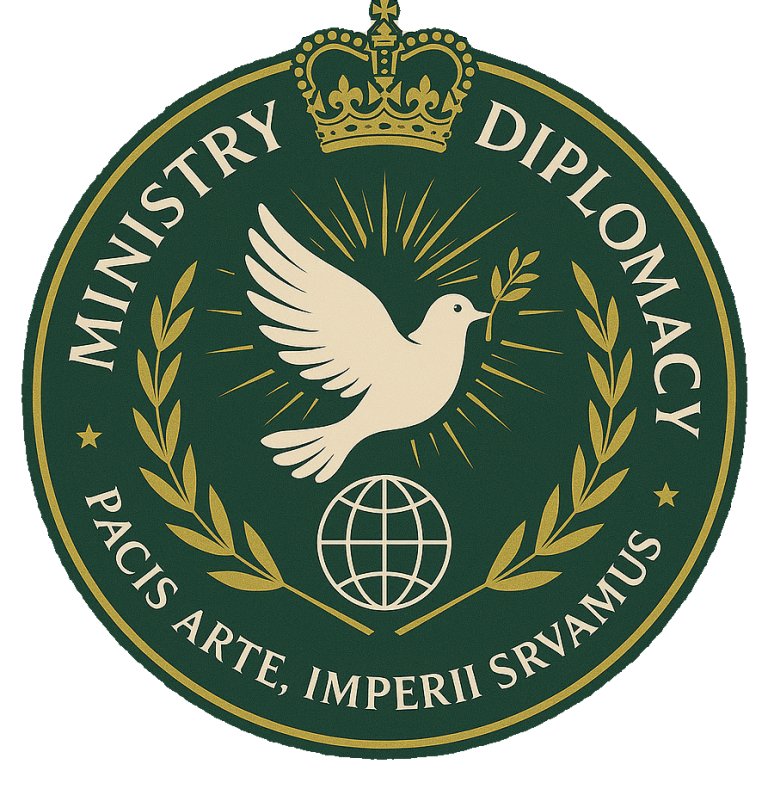
The official motto of the Ministry of Justice shall be:
"In Iustitia, Lux Imperii."
The Seal of the Ministry shall bear the Crowned Scales of Justice, a Radiant Starburst, and a Globe, encircled by a Laurel Wreath, with the name of the Ministry and the Federation inscribed in golden script.
The Ministry shall exercise its powers independently, yet remain accountable to:
- The Grand Assembly (through annual reporting and review)
- The Emperor (through direct assent to major reforms or cases of extraordinary justice)
- The High Imperial Court (through judicial review)

Minister - brief quote

Ministry Building

Lorem ipsum dolor sit amet, consectetur adipiscing elit. Nulla euismod condimentum felis vitae efficitur. Sed vel dictum quam, at blandit leo.
Ministry of Diplomacy
In solemn recognition that justice is the cornerstone of enduring peace, noble order, and the preservation of the rights of all citizens under the Eternal Crown, the Imperial Federation of Meridian hereby ordains and establishes the Ministry of Justice. Let it stand as the shield of the innocent, the sword of law, and the lamp by which the Empire's honor and unity are safeguarded.
"In Iustitia, Lux Imperii."
The Ministry of Justice is constituted as an executive organ of the Imperial Federation of Meridian, subordinate only to the Constitution, the Codex of Imperial Law, and the authority of the Crown.
Its primary mandate is the enforcement, preservation, and dignified execution of all laws ratified by the Grand Assembly, proclaimed by the Emperor, or issued under the Codex of Imperial Law.
Duties and Powers
- Guardianship of Law - Enforce the Codex of Imperial Law across all provinces and dominions. Ensure the uniform application of law and judicial standards.
- Oversight of Judiciary - Supervise the High Imperial Court and all subordinate courts. Administer appointments, oaths, and disciplinary proceedings for Magistrates and Judges.
- Legislative Counsel - Advise the Grand Assembly and Presidential Council on all matters pertaining to the creation, amendment, and codification of law.
- Civil Rights Protection - Safeguard the constitutional rights of all citizens. Investigate, prosecute, and remedy violations against persons or property.
- Imperial Prosecution - Conduct prosecutions of high crimes, treason, sedition, corruption, and abuse of office.
- Legal Integrity - Maintain the purity and dignity of the law through the Imperial Codex Revision Office.
- Pardon and Clemency Recommendations - Review petitions for imperial pardon, commutation, or amnesty and issue formal recommendations to His Imperial Majesty.
Structure
The Ministry of Justice shall consist of the following Offices:
- Office of the High Justiciar: Chief administrator and voice of the Ministry.
- Office of Imperial Prosecutions: Oversees the prosecution of high crimes.
- Codex Revision Office: Responsible for maintaining and revising the Codex of Imperial Law.
- Office of Rights and Liberties: Dedicated to monitoring and upholding civil rights.
- Office of Judicial Oversight: Supervises and disciplines Magistrates and Judges.
- Additional bureaus may be commissioned by decree of the Minister, subject to Assembly assent.

The official motto of the Ministry of Justice shall be:
"In Iustitia, Lux Imperii."
The Seal of the Ministry shall bear the Crowned Scales of Justice, a Radiant Starburst, and a Globe, encircled by a Laurel Wreath, with the name of the Ministry and the Federation inscribed in golden script.
The Ministry of Justice is constituted as an executive organ of the Imperial Federation of Meridian, subordinate only to the Constitution, the Codex of Imperial Law, and the authority of the Crown.
Its primary mandate is the enforcement, preservation, and dignified execution of all laws ratified by the Grand Assembly, proclaimed by the Emperor, or issued under the Codex of Imperial Law.
The Ministry shall exercise its powers independently, yet remain accountable to:
- The Grand Assembly (through annual reporting and review)
- The Emperor (through direct assent to major reforms or cases of extraordinary justice)
- The High Imperial Court (through judicial review)

Minister - brief quote

Ministry Building

Lorem ipsum dolor sit amet, consectetur adipiscing elit. Nulla euismod condimentum felis vitae efficitur. Sed vel dictum quam, at blandit leo.
Ministry of Justice
In solemn recognition that justice is the cornerstone of enduring peace, noble order, and the preservation of the rights of all citizens under the Eternal Crown, the Imperial Federation of Meridian hereby ordains and establishes the Ministry of Justice. Let it stand as the shield of the innocent, the sword of law, and the lamp by which the Empire's honor and unity are safeguarded.
"In Iustitia, Lux Imperii."
("In Justice, the Light of the Empire.")
Duties and Powers
- Guardianship of Law - Enforce the Codex of Imperial Law across all provinces and dominions. Ensure the uniform application of law and judicial standards.
- Oversight of Judiciary - Supervise the High Imperial Court and all subordinate courts. Administer appointments, oaths, and disciplinary proceedings for Magistrates and Judges.
- Legislative Counsel - Advise the Grand Assembly and Presidential Council on all matters pertaining to the creation, amendment, and codification of law.
- Civil Rights Protection - Safeguard the constitutional rights of all citizens. Investigate, prosecute, and remedy violations against persons or property.
- Imperial Prosecution - Conduct prosecutions of high crimes, treason, sedition, corruption, and abuse of office.
- Legal Integrity - Maintain the purity and dignity of the law through the Imperial Codex Revision Office.
- Pardon and Clemency Recommendations - Review petitions for imperial pardon, commutation, or amnesty and issue formal recommendations to His Imperial Majesty.
Structure
The Ministry of Justice shall consist of the following Offices:
- Office of the High Justiciar: Chief administrator and voice of the Ministry.
- Office of Imperial Prosecutions: Oversees the prosecution of high crimes.
- Codex Revision Office: Responsible for maintaining and revising the Codex of Imperial Law.
- Office of Rights and Liberties: Dedicated to monitoring and upholding civil rights.
- Office of Judicial Oversight: Supervises and disciplines Magistrates and Judges.
- Additional bureaus may be commissioned by decree of the Minister, subject to Assembly assent.
©Copyright. All rights reserved.
We need your consent to load the translations
We use a third-party service to translate the website content that may collect data about your activity. Please review the details in the privacy policy and accept the service to view the translations.
